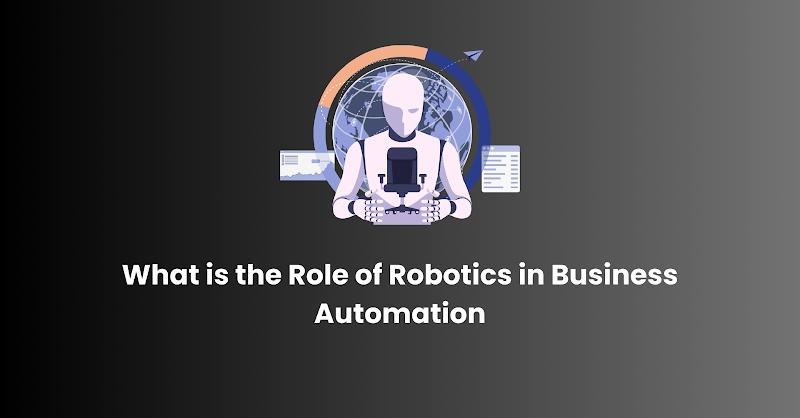Businesses are increasingly using robotics to automate various aspects of their daily operations to meet their needs. It’s not a new idea to use robotics for corporate management. Over time, it has shifted, initially with simple automation in manufacturing facilities and progressively incorporating a wider range of sectors and roles. These days, robots have a major impact on how companies run and provide services to their clients. In this blog, we will look at the importance of RPA Certification and the function of Robotics in business automation as well.
The Impact of Robotics on Business Efficiency
Streamlining Operations
Streamlining operations is one of the main advantages of integrating robotics into company processes. Human workers can concentrate more on creative and strategic work, and robots complete repetitive and time-consuming jobs with accuracy and consistency.
Reducing Human Error
Human errors are meant to happen no matter how experienced the workforce is. Where mistakes like weariness, distraction, or negligence do not occur in robots, businesses may significantly reduce the possibility of errors by automating crucial procedures, especially in areas where accuracy is paramount.
Enhancing the customer experience
The efficiency and correctness of business operations directly influence the client experience. Organisations can provide quicker and more reliable customer services by using robotics to perform order processing, inventory management, and customer care. As a result, customer satisfaction and engagement increase.
What is RPA? – Robotic Process Automation
Robotic Process Automation (RPA) is an area of robotics that focuses on automating recurring, rule-based operations using software robots, or “bots”. These bots are meant to simulate human interactions with digital systems such as websites and software applications. RPA is extremely versatile and may be used in various businesses and tasks.
Applications of Robotics in Business
Manufacturing and assembly
Manufacturing was one of the first industries to use robotics for automation. Robots are used in assembly, welding, and quality control jobs, resulting in higher production rates and consistent product quality.
Supply Chain Management
Robotics have logistics and supply chain management applications for tasks such as material handling, inventory management and order fulfilment. Automated warehouses and distribution centres have transformed order processing, delivery speed, and efficiency.
Customer service and support
Customer service and assistance have been transformed by chatbots and virtual assistants driven by AI and natural language processing. They can handle inquiries, resolve issues, and provide information 24 hours a day, seven days a week, increasing customer satisfaction and reducing the cost of service.
Data Entry and Processing
When done manually, entering data and processing can be time-consuming and error-prone procedures. Data extraction, validation, and entry are some areas where robotic systems shine, ensuring data accuracy and compliance.
Challenges and Considerations
Implementation Challenges
Robotics applications in corporate operations require considerable early investments in technology and training. To ensure a smooth transition, organisations must carefully prepare their automation programmes.
Data security and privacy
With the growing use of robotics, the necessity to secure critical data is also increasing. Businesses must implement effective cybersecurity procedures to protect their systems and customer information.
Human-Automation Collaboration
While robotics can automate many jobs, the human touch is still important in some areas, such as decision-making and complicated problem-solving. Organisations have to tackle the challenge of finding the correct balance between human and automated workers.
The Future of Robotics in Business Automation
AI Integration
Deeper integration with artificial intelligence (AI) is the future of robotics in corporate automation. AI-powered robots are able to perform more sophisticated tasks, make decisions, and adapt to changing circumstances than humans.
Increased Customisation
Businesses will be able to customise automation solutions to their specific needs as automation technologies progress. Customised robots and software will become more widely available, allowing organisations to better enhance their procedures.
Ethical and regulatory concerns
As automation becomes more common, ethical concerns about job displacement and the proper use of AI and robotics will likely emerge. To address these problems, laws and regulations must emerge.
Benefits of RPA
- Cost Efficiency: RPA replaces manual labour in repeated processes, reducing labour costs and increasing cost efficiency.
- Accuracy: RPA bots perform jobs accurately while reducing errors and expenses.
- Scalability: Without extensive recruitment or training, RPA can rapidly move up or down according to changing company needs.
The Importance of RPA Certification
As the popularity of RPA grows, so does the demand for experts knowledgeable about deploying and managing RPA solutions. Individuals may gain knowledge in this subject through RPA certification programmes, making them important assets to organisations wishing to take advantage of the power of automation. Earning an RPA certification increases one’s professional chances and helps companies properly implement RPA.
Conclusion
Robotics is integral to corporate automation, enhancing productivity, accuracy, and the customer experience. Robotic Process Automation (RPA) certification is crucial for people aspiring to thrive in this profession, as well as firms trying to adopt RPA efficiently. As time goes by, the application of AI and more customisation will continue to shape the future of business automation robotics. At the same time, ethical and legal considerations will ensure it is used responsibly.

